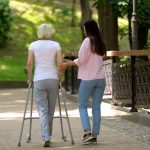
The Importance of Bone Health and Parkinson’s Disease Falls can be a major difficulty for people with Parkinson’s disease...see more

The Importance of Bone Health and Parkinson’s Disease Falls can be a major difficulty for people with Parkinson’s disease...see more

Lower back pain is an extremely common problem in the general population, as...see more

Balance Impairment and Falls in Parkinson’s Disease One of the most challenging symptoms of Parkinson’s disease (PD) that fundamentally...see more

Dr. Gilbert discusses the various abnormal postures associated with Parkinson’s disease. Posture and PD A well-established but poorly understood...see more

Advanced Parkinson’s and Multiple System Atrophy As part of our Planning for the What Ifs series, today we continue to expand...see more

The pipeline for Parkinson’s disease (PD) medications is extremely crowded these days, with multiple medications at various stages of...see more

Today I will address the potential link between Parkinson’s disease and a common neurologic condition called peripheral neuropathy. This...see more

Atypical parkinsonian syndromes Progressive Supranuclear Palsy and Corticobasal Degeneration As part of our Planning for the What Ifs series,...see more

It is common for a person with Parkinson’s disease (PD) to attribute every new symptom that develops to PD....see more

A tremor doesn’t always mean it’s Parkinson’s Many people think of Parkinson’s disease (PD) as the “tremor disease”, so...see more
Simple Email Signup v2 (Salsa replacement form)